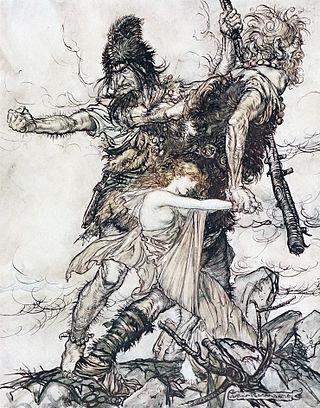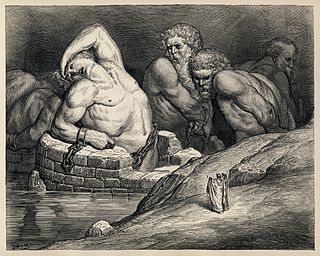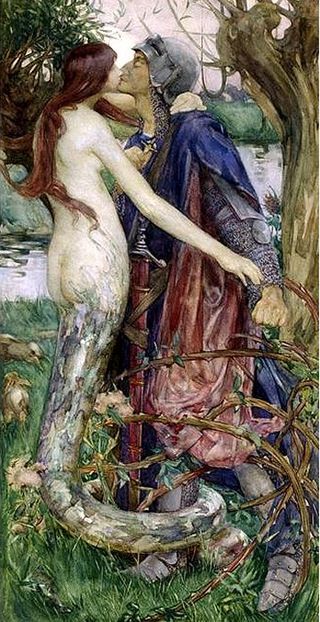
Ares is the Greek god of war and courage. He is one of the Twelve Olympians, and the son of Zeus and Hera. The Greeks were ambivalent towards him. He embodies the physical valor necessary for success in war but can also personify sheer brutality and bloodlust, in contrast to his sister, the armored Athena, whose martial functions include military strategy and generalship. An association with Ares endows places, objects, and other deities with a savage, dangerous, or militarized quality.

In folklore, giants are beings of human-like appearance, but are at times prodigious in size and strength or bear an otherwise notable appearance. The word giant is first attested in 1297 from Robert of Gloucester's chronicle. It is derived from the Gigantes of Greek mythology.

In Greek and Roman mythology, the Giants, also called Gigantes, were a race of great strength and aggression, though not necessarily of great size. They were known for the Gigantomachy, their battle with the Olympian gods. According to Hesiod, the Giants were the offspring of Gaia (Earth), born from the blood that fell when Uranus (Sky) was castrated by his Titan son Cronus.

In Greek mythology, the Aloadae or Aloads were Otus or Otos and Ephialtes, Thessalian sons of Princess Iphimedia, wife of Aloeus, by Poseidon, whom she induced to make her pregnant by going to the seashore and disporting herself in the surf or scooping seawater into her bosom. From Aloeus, sometimes their real father, they received their patronymic, the Aloadae. They had a sister Pancratis (Pancrato) who was renowned for her great beauty.
Aloeus can indicate one of the two characters in Greek mythology:
There were two characters named Epeius or Epeus in Greek mythology.
Agrius in Greek mythology, is a name that may refer to:
In Roman and Greek mythology, Capys was a name attributed to three individuals:
Euryalus refers to the Euryalus fortress, the main citadel of Ancient Syracuse, and to several different characters from Greek mythology and classical literature:

The Areopagus is a prominent rock outcropping located northwest of the Acropolis in Athens, Greece. Its English name is the Late Latin composite form of the Greek name Areios Pagos, translated "Hill of Ares". The name Areopagus also referred, in classical times, to the Athenian governing council, later restricted to the Athenian judicial council or court that tried cases of deliberate homicide, wounding and religious matters, as well as cases involving arson of olive trees, because they convened in this location. The war god Ares was supposed to have been tried by the other gods on the Areopagus for the murder of Poseidon's son Halirrhothius.

Lamia, in ancient Greek mythology, was a child-eating monster and, in later tradition, was regarded as a type of night-haunting spirit (daemon).
Constitution of the Athenians may refer to either of two ancient treatises on the subject of the government of Athens:
Asius or Asios may refer to:
In Greek mythology, Borysthenis may refer to two distinct individuals:
The name Alcon or Alco can refer to a number of people from classical history:

The following outline is provided as an overview of and topical guide to ancient Greece:
In Greek mythology, the name Eurythemis may refer to the following women:

In Greek mythology, Polybotes was one of the Giants, the offspring of Gaia (Earth), and Uranus (Sky). He fought Poseidon during the Gigantomachy, the war between the Giants and the gods.

The Athenian Revolution was a revolt by the people of Athens that overthrew the ruling aristocratic oligarchy, establishing the almost century-long self-governance of Athens in the form of a participatory democracy – open to all free male citizens. It was a reaction to a broader trend of tyranny that had swept through Athens and the rest of Greece.
This page is based on this
Wikipedia article Text is available under the
CC BY-SA 4.0 license; additional terms may apply.
Images, videos and audio are available under their respective licenses.







